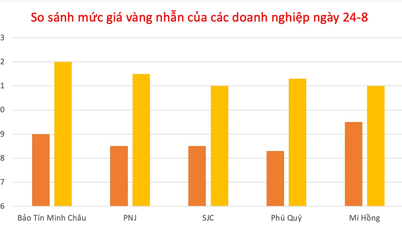
Using too many prescription drugs is very dangerous for the elderly - Photo: FREEPIK
According to The Washington Post, taking too many medications, also known as polypharmacy, can affect people of all ages, but is especially dangerous for the elderly - people who often have multiple illnesses at the same time and whose bodies no longer process medications as well as when they were younger.
Julie Cusick was already on multiple medications for chronic lung disease. At least four specialists prescribed new medications to treat her psychiatric, cognitive, and other problems. Then a car accident made things worse.
“They bombarded her with drugs. One after another,” said her sister, Joanne Cusick. As Julie continued to deteriorate and become more confused, they prescribed more drugs, including a dementia drug and two antipsychotics, which the sisters later learned were never meant to be taken together.
A geriatric psychiatrist finally realized that Julie was not suffering from dementia or psychosis, and gradually weaned her off unnecessary medications. A pulmonologist is trying to wean her off, or even completely off, the lung medications she had been on for years. She is now alert and active, living alone in a senior living facility. She takes classes at a senior center, goes to the gym, and makes new friends.
Older adults who take too many prescription medications can worsen or cause a range of problems, including heart disease, blood pressure problems, drowsiness or loss of balance, increased risk of falls, dementia, or make confusion or confusion worse in people who already have cognitive impairment.
The more medications you take, the more likely you are to have drug interactions. You may also continue to take a medication for much longer than your prescribing doctor originally intended.
The dangers of polypharmacy are widely recognized. The American Geriatrics Society has since established criteria for safe prescribing. Medical groups have also promoted a “geriatric-friendly” model of care. Doctors, nurses, and other health care providers are encouraged to be more vigilant and check everything their patients are taking. Yet research shows that overprescribing and its consequences continue.
Ideally, healthcare providers would do medication reviews to determine which medications are helpful and which are not. But that doesn’t always happen. And even in a very good system, things can go wrong.
“People keep hoarding medications. Especially when they see different doctors, that medication list keeps getting longer,” said Dr. Susan Parks, director of geriatrics at Thomas Jefferson University in Philadelphia.
Patients here are given a marked brown paper bag to bring everything they are taking – both prescription and over-the-counter – for assessment. Some medications will be “discontinued,” accompanied by an explanation and reassurance that they are not taking them.
will be better.
Sometimes patients and doctors have to weigh the pros and cons. For example, a patient may want to continue taking an incontinence medication even though it may cause dizziness or confusion. The doctor will help minimize the risk. But sometimes, instead of trying to stop the medication, prescriptions are piled up.
Source: https://tuoitre.vn/dung-qua-nhieu-thuoc-ke-don-rat-nguy-hiem-voi-nguoi-cao-tuoi-20250810233212806.htm



![[Photo] Impressive image of 31 planes taking flight in the sky of Hanoi during their first joint training](https://vphoto.vietnam.vn/thumb/1200x675/vietnam/resource/IMAGE/2025/8/24/2f52b7105aa4469e9bdad9c60008c2a0)
![[Photo] The ceremonial artillery is ready to "fire" for the second parade rehearsal at My Dinh National Stadium.](https://vphoto.vietnam.vn/thumb/1200x675/vietnam/resource/IMAGE/2025/8/24/883ec3bbdf6d4fba83aee5c950955c7c)








































































































Comment (0)